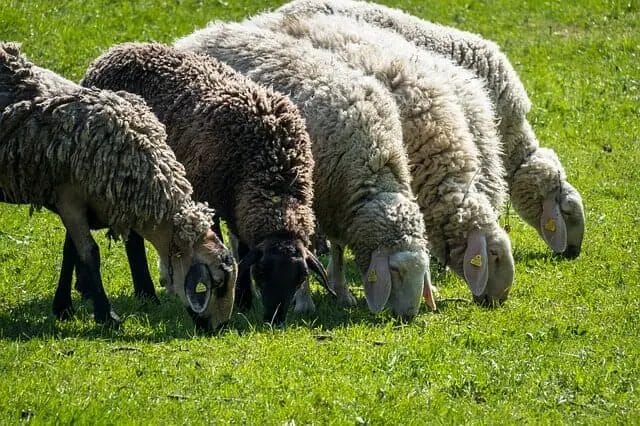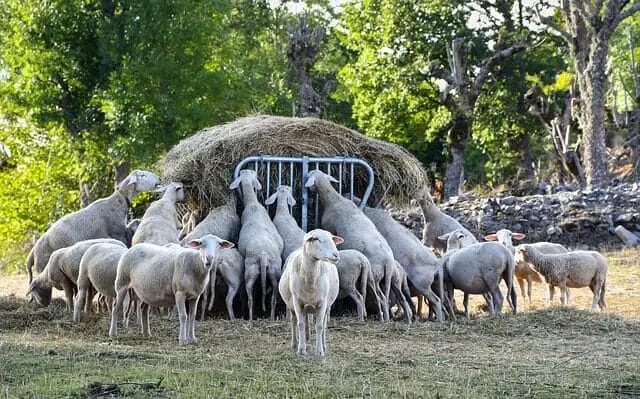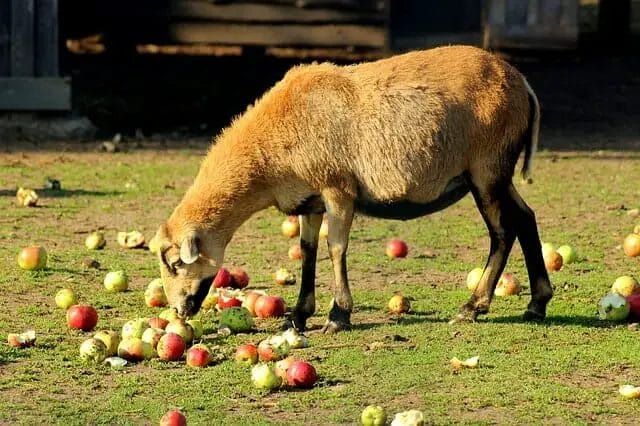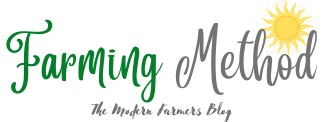When you are into sheep farming there will be a common question what do they eat? or don’t eat? In general, they eat .5%-4.5% of their body weight.
In this article, we are going to explore the best feed for sheep and guide you on the feeding process.
This article includes-
- What does a sheep eat and drink?
- What they don’t eat? or poisonous for their diverse system.
- List of treats and supplements that they love to eat.
- Sheep feed list in winter.
- The best foods and feeding process for sheep in order to gain health and superior milk production.
- The daily nutrient requirement and tips to fulfill their daily diet needs.
Here, Unlike goats feed lists, sheep feed list is long. to So, let’s start with patients and always keep notes-
Basic Nutrients to Ensure in Daily Diet:
The seeps are mammal animals. This animal prefers to grazing on grass or legume vegetation.
Some of the basic nutritional elements that a sheep must need is:
1. Protein
2. Vitamin
3. Fat
4. Fiber
5. Mineral & Salt
6. Carbohydrate
Hence, while choosing any organic, supplement, and store food make sure that food has these nutritional values. Learn more about the nutrition requirements of Sheep.
Now,
The majority of food the peeps consumes are Roughage.
What does a Sheep Eat as Daily Diet?

There are different kinds of roughage that are adequate for feeding them. The universal daily diets are pasture, hay, haylage, grass & corn silage, and straw. On the other hand, there are treats and supplements, which are beneficial to get healthy and high-quality milk, meat.
Like cows and goats sheep is one of the popular domestic animals on the farm. For the purposes of meat, milk, and wool it’s profitable to raise sheep on one’s farm. Sheep are adaptive to any environment and require less caring which is good for business. But to thrive in any livestock business feeding is a key element. Nutritious food helps to grow one’s production rate abundantly.
-
Pasture
Sheep eat any kind of pasture plants like forbs, grass, legumes. But of all this sheep goes for the forbs first. Forbs are broadleaf plants other than grass and contain a great amount of nutrition.
They are more nutritious than clover and grass. At a certain stage, these forbs also grow flowers too. As sheep are adaptable livestock they can eat anything nutritionally.
Sheep are picky grazers than the castle. Further, they eat more plants than cattle but less than goats.
As sheep spend most of their time outside it’s essential to provide them with a perfect pasture. Sheep spend more than 8 hours grazing. So it can be simply understood that most of the feeding of the sheep comes from the pasture. To provide the sheep with great pasture you’ll need nutritious soil, great forage, rainfall. And all of this depends on the weather and location of your farm.
The best way to seed pasture is a mixture of legumes and grasses. But don’t seed too many plants cause some plants may not grow due to plant density. There is some balanced mixture that you can use are:
- Bunch Grasses (Perennial ryegrass, Italian ryegrass, timothy, tall fescue, orchardgrass),
- Legumes (Kura clover, birdsfoot trefoil, alsike clover, alfalfa, white clover, red clover),
- Sod-Forming Grasses (smooth bromegrass, reed canary grass, Kentucky bluegrass),
-
HAY

Hay are stored grass, legumes, or other herbaceous plants. These are often cut and dried for use as animal fodder. From an economical standpoint, hay is most cost-efficient.
In winter or odd climates or even when green feeds are not available sheep can live on stored hay.
However, they don’t like rotten or too old hays.
Now,
Legumes hay has 50 to 75% more protein and 3x minerals than low-quality grass hay. However, the high-quality hay are nearly equal in terms of nutrients value.
What types of hay is for sheep?
- Green grass hay or leafy alfalfa is normally the best feed for sheep.
- They don’t seem to like to eat coarse hay.
- The lambs love to eat legumes hay whereas the other mature ones like grass hay.
How much hay per day?
In general, adult males will eat 2.2lbs ( 1kg) hay/ day.
The ewes need approx 1.5 lbs to 2 lbs hays per day, whereas while they are milking the amount of hay supply can be adjusted to 5 lbs.
In winter, each sheep will consume 5 small bales of hay (on average 4.5 lbs per sheep).
-
Water and Drinks:
Water is undoubtedly a nutrient of life. It’s unnecessary to speak about its essentialities.
An average sheep drink 1-2 gallons of water a day.
Now,
How much water you will provide the sheep will depend upon the kind of breed, climate, production rate, and size. But how much water will the sheep consume will depend upon their physical state, how much they eat, environmental condition, etc.
But,
In the dry season and when ewes get pregnant sheep will consume up to 4 gallons of water.
Also in cold weather, if the water is ice-free the consumption rate can be high.
Sometimes the sheep can drink less water than usual. This happens when the food content is highly moist. On the other hand, when the food will be drier the sheep will consume more water vice-versa.
-
Silage or Haylage
Silage are forage or grain crops. It is a replacement or supplement for hay. This can be successfully fed to sheep to enhance animal health, pasture utilization, giving surplus feed when other foods are hard to get.
This are the common feed for inhouse grown sheep. The difference between haylage and hay is the way that the grass is conserved. The sillage is more dry, as they are compressed and often cut earlier stages.
Moreover, in the winter season, it can play a huge role by fulfilling their daily needs. Especially in commercial farming when the storage can be an issue.
Never feed spoiled haylage to sheep.
Now,
You can provide 0.5 – 0.6 lbs in their daily diet.
-
Grain (Concentrates)
Grain is a common supplement for sheep. It contains oats, barley, corn, wheat, and many other nutrients. It is highly nutritious as it generates a genetic factor in a lamb that helps in their growth rate. It’s essential for pregnant ewes, ewes nursing two or more lambs, rams to achieve their maximum growth.
Some may think the process is unnatural. But it’s wrong to think that. Cause grain is made with natural elements and sheep are accustomed to eating seeds. To make the grain more balanced you can also add cottonseed and soybean meal.
Make sure to feed your sheep a standard amount of grain. Cause feeding too much grain can cause digestion problems. But the feeding amount can be increased progressively.
Now,
Grains are deficient in calcium, so you may provide 1%-2% limestone with it.
What types of grain is best for sheep?
Wheat, maize, or corn (Dry Whole), barley, sorghum, oats are the most common ones.
-
Green Plants
All sheep eat plants. The type of these plants varies according to different places and climates. But researchers have found that forages of the temperate climate are more nutritious than the tropical ones. As sheep spend most of their time grazing it’s necessary to provide them with nutritious plants. Although any type of forage is nutritious if it’s eaten in a vegetative state.
But you got to be careful about the plant that your sheep eats. Cause there are many plants that are poisonous and toxic. And these plants could harm your sheep. If you find any unfamiliar plant in your garden just remove it from your garden.
You can’t feed them pastures like- cape wood, ragwort, bracken. There are some harmful weeds like- oleander, foxglove, rhododendrons which should be kept out of touch.
-
Vegetables
In general, they like greed and Luffy green and brassicas vegetables.
- Cabbage leaves,
- Bean plant,
- Kale plants,
- Banana Skins,
- Corn cobs
- Cauli and
- Broccoli leaves
-
Treats

Sheep get most of their nutrition from grazing. But as their master sometimes you can treat them to some special food items. You can fill their diet with 5-10% of daily diet.
This could make them happy. But don’t feed them these items too much cause it could make them fat and can cause diseases like urinary calculi, bloat, enterotoxemia, etc. Things that you can treat them with:
- Pears
- Pumpkin
- Squash
- Watermelon
- Apple
- Lettuce
- Oats
- Black Oil Sunflower Seed (To improve their coat)
- Grapes
- Carrots
- Celery
- Alfa Cubes (For Only Females)
-
Supplements
Sheep should be given some necessary supplements with all the other food. If sheep sufferers from the shortage of nutrition supplements are the element to fill that gap. Some great supplements for sheep are:
- Vitamin A, D, E
- Potassium
- Magnesium
- Sodium
- Calcium,
- Chlorine
- Sulfur
- Zinc
- Cobalt
- Copper
- Iodine
Molybdenum - Iron
- Selenium
- Potassium
But in most cases, the sheep are deprived of selenium and vitamin E. If this happens you should talk to a veterinarian for getting a blood test and other ways to solve the problem.
Deficiency of any single nutrition can cause Paralysis, stiffness, neurological problems, lameness and, white muscle disease.
Further sheep can’t be allowed to eat sheep-goat mixed supplements. Cause these supplements contains a great amount of copper. If the sheep consumes copper more than required it may cause toxicity in the body.
-
Forbs
The fobs are weeds (annual or perennial). In the gazing period, they prefer fobs.
What do Sheep Eat in the Winter?
As in winter grazing is not that much possible like other climates of the year sheep can’t eat pasture as much they like. Stocked food is the best option to feed the sheep. Cause sheep graze about 8 hours or so and it gets most of their nutrition from pasture and grass. But for snow, and the low temperature it’s not possible.
One should stock hay as much as they can. Also, you can feed them store-feed and supplement that you have fed them the whole year. The most important thing you should be careful about is not running out of food.
Cause more the sheep eats the more it can keep itself warm. As sheep are ruminants they can digest roughage which involves fermentation. And this fermentation creates heat which keeps the sheep warm. So the more they eat the more they can be comfortable in the winter.
Stored Feeds in Winter:
At some point due to weather and climate forage and plants aren’t that much available. In this regard stored and harvested feeds are the best option. Some best-stored feeds are hay, silage, silage, green chop, and other by-products.
Hay is a grass that is cut and stored for sheep. It’s a great livestock feed. Comes in handy when grazing isn’t available.
Silage is a green forage that is fermented instead of cutting and is stored in a silo or any airproof system. Cause air could make the silage moldy which could cause the sheep a circling disease called listeriosis.
In the USA, pasture and plants are cut and brought to sheep. This process requires some labor. The plants and the pasture is called green chop.
Along with all this, some high-quality by-products like corn gluten feed, soybean hulls, peanut hulls, cottonseed, wheat middlings can be fed to sheep. Fruits like onions, apples, pumpkins, and other leftovers can also be fed to sheep.
List of Food you Should not Provide to Sheeps
List of feeds that are poisonous & You Shouldn’t Feed Sheep or they don’t like to eat.
There are many plants, trees even leave that you shouldn’t feed your sheep. They are highly toxic and can cause serious damages to the health condition of the sheep. Things that shouldn’t be fed to sheep are:
- Holly Trees
- Onion skins
- Yew Trees
- Plum Trees
- Cherry Trees
- Pumpkin
- Poppy
- Potato
- Kale
- Bread (As it can cause obesity)
- Lilacs
- Elderberry Trees
- Oleander
- Hemlock
- Blue-Green Algae (very poisonous)
- Lily Of the Valley
- Chokecherry Trees
- Milkweed
- Ponderosa pine trees
- Rhubarb
- Alfalfa (Can cause obesity and urinary blockage)
- Mountain Laurel
- Nightshades
- Red Maple Trees
- St. John’s Wort
- Ornamental Plants
- Animal Products (Toxic For Sheep)
- Buttercup
- Avocado
- Azaleas
- Cassava
- Foxglove
- Bracken Ferns
- Chocolate
Frequently Asked Questions
How Many Sheep Per Acre?
If you are not providing any other foods and only rely on gazing you can rise 10 ewes and 15 lambs sheep in one acre.
Can I Porvide Corn Silage?
Yes, you can. But, corn silage contains lower levels of protein, minerals, and vitamins than grass and legumes.
What to feed sheep to fatten up?
You should provide a balanced diet. However, the hay and grain are helpful to gain faster weight.
You should focus on providing high-quality Alfalfa (legumes) hay, & barley.
